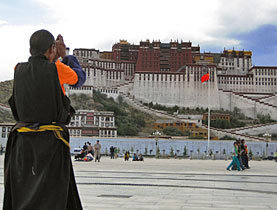
Media mania surrounds Dalai Lama visit

The appearances and media coverage devoted to the Dalai Lama have turned him into something of a star. It is not clear if this is down to the man himself or his image.
Currently in the western part of the country, the Tibetan spiritual and political leader provokes strong reactions from the Chinese leadership, yet is an object of fascination in the West.
For Swiss radio reporter Jean-Marc Falcombello, an expert on Asia, the expectations created by the spiritual crisis in the West are fed by the perfect image of the Dalai Lama. “His image – and not he himself – fits expectations to the point that he is like an actor in a film, where the script hasn’t been written yet.”
An expert on Asia and Buddhism, Falcombello will not be drawn on whether the Dalai Lama is a consenting victim or the organiser of the media hype.
The image creates some confusion. “The idea that this image of the Dalai Lama is powerful for the Tibetan cause doesn’t hold water because if this were the case, the situation of Tibet would have progressed towards a solution, which is obviously not the case,” he regrets.
In 50 years, no western state has recognised the Tibetan government in exile, led by the Dalai Lama. During his 21 visits to Switzerland, the Nobel Peace Prize laureate has never officially been received by the Swiss government.
For his 22nd trip, he has to be content with meeting the speaker of the Swiss House of Representatives, which has fuelled controversy among many defenders of the Tibetan cause.
“Little too professional”
Journalist and author Claude Levenson regrets there has been “a little too much professional organisation” in the two days of teaching, which are more like a concert by a pop star than [an event of] a spiritual leader.
She notes that “there are young people who feel a lot of frustration and question the Dalai Lama’s pacifist approach, but who do not question his actual behaviour; that’s the contradiction”.
Falcombello says that no one can deny that the media coverage of the spiritual leader prevents the suffering of the Tibetan people from being forgotten. But paradoxically he says, the confusion between religion and politics helps Beijing’s position.
He also notes the “irony” that forces the Chinese communist party to have to deal with Tibetan religious affairs.
Fascination
“As for the Chinese population, it knows only too well that the Tibetans are not Chinese but is just as fascinated as Westerners by this ‘pure country’, which is held in high esteem by Chinese tourists.
For S.H., a Chinese dissident in Hong Kong, the question is not about Tibetan independence. “What is important are the people. The Hans (Chinese majority) and the Tibetans are neighbours. They must find a solution if they do not want to pay a heavy price with bloodshed.”
As a trade unionist he says that the main thing is to move forward on human rights in both China and Tibet. “On that subject I respect the Dalai Lama because he places human beings at the centre of his spiritual vision.”
The most urgent issue is for the Tibetans to preserve their culture and religion without waiting for political independence, he adds.
According to some China experts, official historians are beginning to recognise that the idea of the great Chinese nation did not exist before 1911 and certainly not before the arrival of the communists.
“It’s a great step forward and maybe it’s only the first,” Falcombello hopes.
Isabelle Eichenberger, swissinfo.ch (Adapted from French by Robert Brookes)
Tenzin Gyatso
1935: Born to a farming family in the Himalayas.
1937: Recognised as the 14th Dalai Lama
1950: Formally enthroned
1959: Flees to Dharamasala in India from Chinese repression and creates the Tibetan government in exile, which he leads.
1989: Receives Nobel Peace prize
The Dalai Lama is in Lausanne on August 4 and 5 to give teaching and a public conference in front of more than 12,000 people.
He met the president of the Vaud government, Pascal Broulis, and Philippe Leuba, the head of the canton’s Office of the Interior, on the sidelines of the conference.
On August 6, he will meet the speaker of the House of Representatives, Chiara Simoneschi-Cortesi. The federal government will not receive him officially.
Afterwards he will talk at a conference in Geneva, attended by more than 100 Chinese and Tibetan intellectuals.
Switzerland supports dialogue between the Chinese authorities and Tibetan religious leaders, including the Dalai Lama, says foreign ministry spokesman Andreas Stauffer.
The international community, including Switzerland, recognises Tibet as an autonomous region of China, ranked as a province since 1951, the ministry says.
Switzerland does not recognise the Tibetan government-in-exile based in Dharamsala, India and has no formal contact with its representatives. The ministry argues that only dialogue can resolve the Tibetan issue in a way that is appropriate for an autonomous region, including the issue of religious freedom and cultural rights.
Switzerland says Tibet is among its areas of concern, which it regularly raises with China.
Switzerland was the first western country to institutionalise a human rights dialogue with China. This dialogue, launched in 1991, has resulted in regular meetings between the two countries. The tenth round of talks was held in Beijing in July 2008 and the 11th is planned for this summer.

In compliance with the JTI standards
More: SWI swissinfo.ch certified by the Journalism Trust Initiative

























You can find an overview of ongoing debates with our journalists here . Please join us!
If you want to start a conversation about a topic raised in this article or want to report factual errors, email us at english@swissinfo.ch.